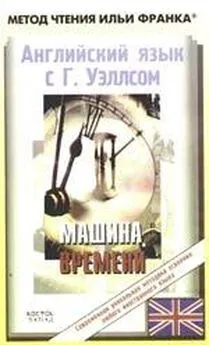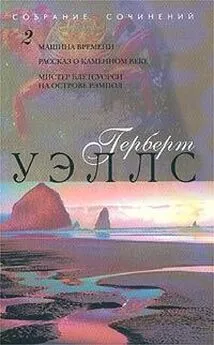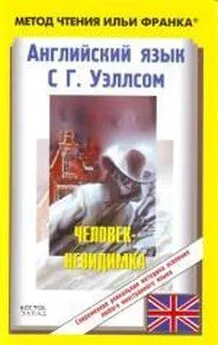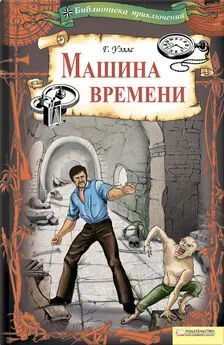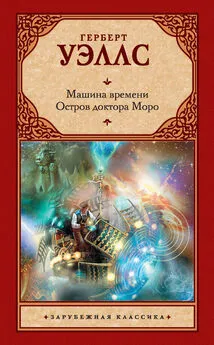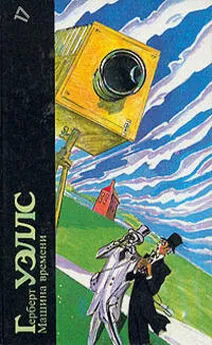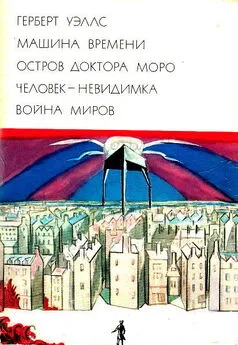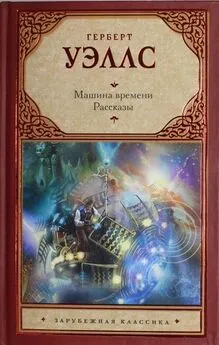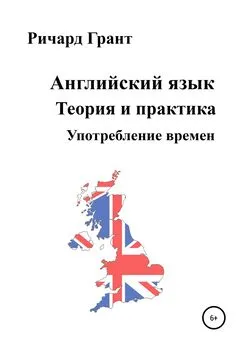H. Wells - Английский язык с Гербертом Уэллсом. Машина Времени
- Название:Английский язык с Гербертом Уэллсом. Машина Времени
- Автор:
- Жанр:
- Издательство:неизвестно
- Год:неизвестен
- ISBN:нет данных
- Рейтинг:
- Избранное:Добавить в избранное
-
Отзывы:
-
Ваша оценка:
H. Wells - Английский язык с Гербертом Уэллсом. Машина Времени краткое содержание
Английский язык с Гербертом Уэллсом. Машина Времени - читать онлайн бесплатно полную версию (весь текст целиком)
Интервал:
Закладка:
advertisement [qd`vWtIsmqnt], constitute [`kOnstItjHt], paradise [`pxrqdaIs], guess [ges]
'Social triumphs, too, had been effected. I saw mankind housed in splendid shelters, gloriously clothed, and as yet I had found them engaged in no toil. There were no signs of struggle, neither social nor economical struggle. The shop, the advertisement, traffic, all that commerce which constitutes the body of our world, was gone. It was natural on that golden evening that I should jump at the idea of a social paradise. The difficulty of increasing population had been met, I guessed, and population had ceased to increase.
'But with this change in condition comes inevitably adaptations to the change (но изменение условий неизбежно влечет за собой: «но с изменением условий неизбежно приходит» приспособление к этим изменениям). What (что), unless biological science is a mass of errors (если только биологическая наука — не ряд заблуждений; error— ошибка, заблуждение ), is the cause of human intelligence and vigour (является причиной человеческого ума и энергии = стимулирует человеческий ум и энергию)? Hardship and freedom (/только/ трудности и свобода): conditions under which the active, strong, and subtle survive and the weaker go to the wall (/такие/ условия, при которых активные, сильные и ловкие выживают, а более слабые отходят к стене = уступают свое место; subtle— нежный, утонченный, изысканный; искусный, ловкий ); conditions that put a premium upon the loyal alliance of capable men (условия, дающие преимущество честному союзу одаренных людей; capable— способный; одаренный, талантливый ), upon self-restraint (умению владеть собой; torestrain— сдерживать, обуздывать ), patience, and decision (терпению и решительности). And the institution of the family (институт семьи), and the emotions that arise therein (и чувства, там возникающие; toarise— возникать; therein— здесь, там, в этом, в том ), the fierce jealousy (сильная ревность), the tenderness for offspring (нежность к потомству), parental self-devotion (родительское самопожертвование; devotion— набожность; пожертвование; todevote— посвящать /себя чему-то возвышенному/; делять, жертвовать /время, деньги/ ), all found their justification and support in the imminent dangers of the young (все это находит свое оправдание и поддержку в неизбежных опасностях, которым подвергается молодое поколение: «опасностях молодых»).
alliance [q`laIqns], jealousy [`GelqsI], justification ["GAstIfI`keIS(q)n]
'But with this change in condition comes inevitably adaptations to the change. What, unless biological science is a mass of errors, is the cause of human intelligence and vigour? Hardship and freedom: conditions under which the active, strong, and subtle survive and the weaker go to the wall; conditions that put a premium upon the loyal alliance of capable men, upon self-restraint, patience, and decision. And the institution of the family, and the emotions that arise therein, the fierce jealousy, the tenderness for offspring, parental self-devotion, all found their justification and support in the imminent dangers of the young.
Now , where are these imminent dangers (но где теперь эти неизбежные опасности)? There is a sentiment arising (уже возникает настрой; sentiment — чувство; мнение, настроение, отношение ), and it will grow (и он будет расти), against connubial jealousy (против супружеской ревности), against fierce maternity (против неистового материнского чувства), against passion of all sorts (против страсти любого вида); unnecessary things now (ненужных сейчас чувств: «вещей»; necessary — необходимый ), and things that make us uncomfortable (чувств, доставляющих нам неудобства; comfortable — удобный ), savage survivals (пережитков первобытной дикости; survival — выживание; пережиток ), discords in a refined and pleasant life (несовпадений = несовпадающих с /представлениями/ об утонченной и приятной жизни; discord — разногласие, несовпадение, расхождение/вовзглядах/ ).
'I thought of the physical slightness of the people (я думал о физической слабости этих людей), their lack of intelligence (о недостатке их интеллекта), and those big abundant ruins (тех огромных развалинах /вокруг/), and it strengthened my belief in a perfect conquest of Nature (и все это усиливало мою веру в полной победе над Природой; tostrengthen— усиливать; strength— сила; conquest— победа, завоевание ). For after the battle comes Quiet (ибо после сражения наступает Покой). Humanity had been strong, energetic, and intelligent (человечество было сильным, энергичным и интеллектуальным), and had used all its abundant vitality to alter the conditions under which it lived (и использовало всю свою огромную жизнеспособность для изменения условий, в которых оно жило; toalter— менять/ся/, изменять/ся/ ). And now came the reaction of the altered conditions (а теперь последовала реакция на эти измененные условия).
connubial [kq`njHbIql], abundant [q`bAnd(q)nt], conquest [`kONkwest]
Now , where are these imminent dangers? There is a sentiment arising, and it will grow, against connubial jealousy, against fierce maternity, against passion of all sorts; unnecessary things now, and things that make us uncomfortable, savage survivals, discords in a refined and pleasant life.
'I thought of the physical slightness of the people, their lack of intelligence, and those big abundant ruins, and it strengthened my belief in a perfect conquest of Nature. For after the battle comes Quiet. Humanity had been strong, energetic, and intelligent, and had used all its abundant vitality to alter the conditions under which it lived. And now came the reaction of the altered conditions.
'Under the new conditions of perfect comfort and security (при новых условиях полного довольства и безопасности), that restless energy, that with us is strength (та неутомимая энергия, которая у нас является силой; rest — покой, отдых; restless — бепокойный, неутомимый ), would become weakness (должна была превратиться в слабость). Even in our own time certain tendencies and desires (даже в наши дни некоторые стремления и желания; tendency — склонность, стремление, тенденция ), once necessary to survival (когда-то необходимые для выживания), are a constant source of failure (являются постоянным источником неудач; failure — провал, неудача ). Physical courage and the love of battle, for instance, are no great help (физическая храбрость и любовь к сражениям, например, не большая помощь)—may even be hindrances (а, возможно, даже препятствия; hindrance — барьер, препятствие )—to a civilized man (для цивилизованного человека). And in a state of physical balance and security (и в государстве физического равновесия и безопасности), power, intellectual as well as physical, would be out of place (сила, как умственная, так и физическая, была бы совершенно неуместна; place — место; to be out of place — бытьнеуместным ). For countless years I judged there had been no danger of war or solitary violence (я пришел к выводу, что на протяжении бесчисленных лет там не было ни опасности войн, ни авторитарной тирании; solitary — одинокий; единичный; violence — насилие; зд. тирания ), no danger from wild beasts (ни угрозы диких зверей), no wasting disease to require strength of constitution (ни изнурительных болезней, чтобы требовать: «которые требовали бы» силы характера; constitution — учреждение; характер, нрав ), no need of toil (не было и необходимости в тяжелом труде).
hindrance [`hIndrqns], civilized [`sIv(q)laIzd], violence [`vaIqlqns]
'Under the new conditions of perfect comfort and security, that restless energy, that with us is strength, would become weakness. Even in our own time certain tendencies and desires, once necessary to survival, are a constant source of failure. Physical courage and the love of battle, for instance, are no great help—may even be hindrances—to a civilized man. And in a state of physical balance and security, power, intellectual as well as physical, would be out of place. For countless years I judged there had been no danger of war or solitary violence, no danger from wild beasts, no wasting disease to require strength of constitution, no need of toil.
For such a life (при такой жизни), what we should call the weak are as well equipped as the strong (те, кого мы называем слабыми, точно так же хорошо приспособлены, как и сильные; to equip — снаряжать, оснащать; зд. приспосабливать ), are indeed no longer weak (и на самом деле не являются больше слабыми). Better equipped indeed they are (вернее, они даже лучше приспособлены), for the strong would be fretted by an energy for which there was no outlet (потому что сильных подрывала энергия, для которой не было выхода; to fret — разъедать, истрепать; волновать, раздражать; зд. подрывать; outlet — выпуск, вытекание; выход ). No doubt the exquisite beauty of the buildings I saw (несомненно, что изящная красота зданий, которые я видел) was the outcome of the last surgings of the now purposeless energy of mankind (была результатом последнего всплеска ныне бесцельной энергии человечества; purpose — цель; purposeless — бесцельный ) before it settled down into perfect harmony with the conditions under which it lived (перед тем, как оно достигло полной гармонии в условиях, в которых оно жило = своей жизни; to settle down — устроиться, обустроиться )—the flourish of that triumph which began the last great peace (высшая точка той победы, после которой наступил последний великий мир; flourish — расцвет; высшаяточка/развития/ ). This has ever been the fate of energy in security (такова судьба энергии в /условиях/ стабильности); it takes to art and to eroticism (она ищет выход в искусстве и чувственности; to take to — воплощаться/вчем-либо/, искатьвыход/вчем-либо/ ), and then come languor and decay (а затем наступает бессилие и упадок; languor — слабость, вялость; бессилие ).
Читать дальшеИнтервал:
Закладка:
